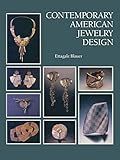Contemporary American jewelry design Libro electrónico Ettagale Blauer
Tipo de material: Libro
en línea Idioma: Inglés Detalles de publicación: New York, New York, United States Van Nostrand Reinhold c1991Descripción: x, 198 páginas ilustraciones 29 centímetrosISBN:
Libro
en línea Idioma: Inglés Detalles de publicación: New York, New York, United States Van Nostrand Reinhold c1991Descripción: x, 198 páginas ilustraciones 29 centímetrosISBN: - 0442003625
- 9781475748567 (Print)
- 9781475748543 (Online)
- Disponible en línea
Incluye bibliografía e índice: páginas 197-198
1. Introduction.. 2. Craft shows.. 3. Craft galleries.. 4. Teachers.. 5. Craft and commercial.. 6. Studio goldsmithing.. 7. Cloisonné.. 8. Granulation.. 9. High-karat gold.. 10. Surfaces.. 11. Patterns.. 12. Epilogue.. Index
Disponible para usuarios de ECOSUR con su clave de acceso
The Phenomenon of Studio Goldsmithing When the history of art in the 1980s is written, much of it will be etched in gold. This is the time of the contemporary goldsmith, an artist who chooses to work in precious metals rather than oils or marble. The contemporary jeweler-as-artist has only recently become a re cognized force. With rare exceptions, the whole field is little more than thirty years old. But it is only within the past fifteen years that these jewelers have entered the jewelry mainstream. The phenomenon of contemporary goldsmithing embraces an eclectic group of artists, each with a unique vision, each taking a per sonal path to jewelry producing. They have as little relationship to the typical, mass-produced jewelry as a champagne maker has to a bottler of orange soda. They approach a piece of art, not a piece of metal. The work is personal and a perfect expression of the "back to the land" movement that spawned it. Many of these goldsmiths were looking not merely for a way to make a living but for a way to make a life that was worthy of living. Running a business while trying to remain a creative metalsmith at the same time is the ongoing challenge. The jeweler-artists have solved or resolved these often conflicting needs in slightly different ways and in a beautiful variety of techniques and styles. Their meth ods, their growth, and their work are discussed here. Inglés
Disponible en línea
Disponible en formato PDF


